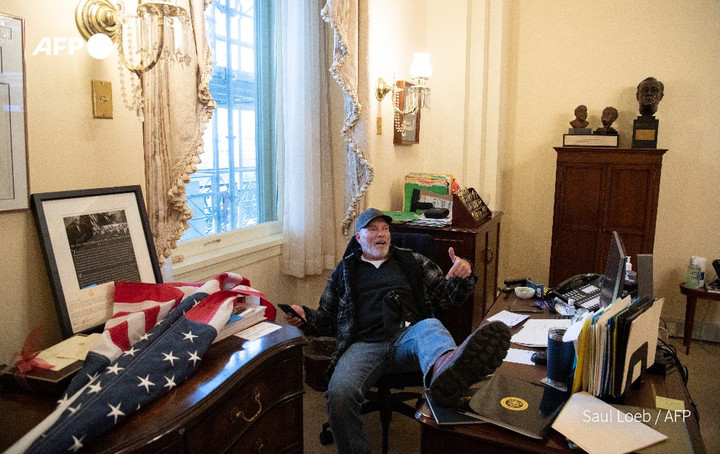The Arkansas man who was photographed on Jan. 6, 2021, with his feet on a desk in then-Speaker Nancy Pelosi’s office was sentenced Wednesday to four and a half years in prison.
Federal prosecutors had asked the judge to sentence Richard “Bigo” Barnett to more than seven years for his actions before, during and after the riot at the U.S. Capitol.
They noted in a court filing that a picture of a smiling Barnett lounging in Pelosi’s office became “one of the best-known images of that day, symbolizing the rioters having wrested control of both the hallowed space and the political process from the nation’s elected leaders.”
Barnett’s lawyers had argued he shouldn’t get more than six months behind bars. “Mr. Barnett is 63-year-old retired firefighter and bull rider from rural Arkansas who came to DC for his very first time to peacefully protest and was unfortunately caught up in the events that turned an ordinary Wednesday into what will forever be known as ‘January 6,'” his lawyers contended.
U.S. District Court Judge Christopher Cooper disagreed, sentencing him to 54 months in prison.
Barnett was convicted in January on eight charges stemming from the Capitol attack, including theft of government property and entering and remaining in a restricted building or grounds with a deadly or dangerous weapon; in addition to the stun device, Barnett armed himself with a ten-pound steel pole, prosecutors said.
Barnett became a widely known symbol of the riot when he was photographed reclining in a chair in Pelosi’s office, with his feet propped up, and what the government referred to as a “stun device” tucked in his pants. Before he left Pelosi’s office, Barnett took an envelope that he later displayed for cameras outside the Capitol.
He also acknowledged leaving what he later called a “nasty note” for Pelosi. It read, “Nancy, Bigo was here,” and ended with a sexist expletive to refer to Pelosi.
Barnett expressed remorse for his actions when he took the witness stand in his own defense. “I shouldn’t have put my feet on the desk,” Barnett told jurors. “At the time I thought it was funny,” he said, but after reflection, it seems “crass.”
After he was convicted, however, he maintained he was the victim of “political persecution” and said the jury that convicted him was “not a jury of my peers.”
Prosecutors pushed back on Barnett’s claims that he’d been unintentionally swept up by the crowd during the Capitol riot and said in court filings that the evidence was clear that Barnett had come to Washington, D.C., that day looking for a fight.
“Barnett was aware of the significance of January 6, 2021. He believed that the United States would be taken over by communists if President-Elect Biden became president and was prepared to do ‘whatever it takes,’ (as he said on social media), including occupying the Capitol, to prevent that from happening,” their filing said.
“He prepared for that violence by arming himself with a stun device and a ten-pound steel pole, both capable of inflicting serious bodily injury. And then he traveled to Washington, D.C. with those weapons,” the filing continued, noting that he only left the Capitol after he was hit by chemical spray – and then bragged about his actions to reporters.
After his arrest, “Barnett sought to profit from his notoriety and criminal conduct,” including by selling autographed pictures of himself in Pelosi’s office, prosecutors said. They added that he’s continued tweeting “disinformation” and conspiracy theories about the Jan. 6 attack since his conviction.
They said those statements show “he is without remorse and would readily engage in similar conduct in the future.”




